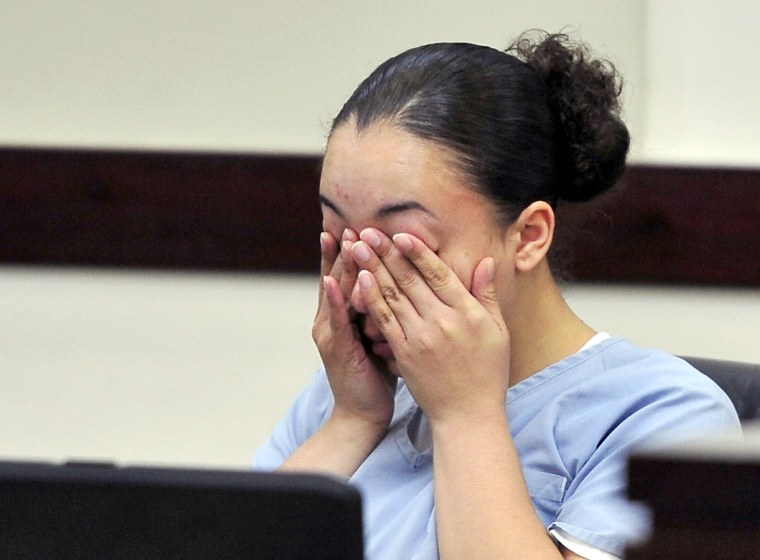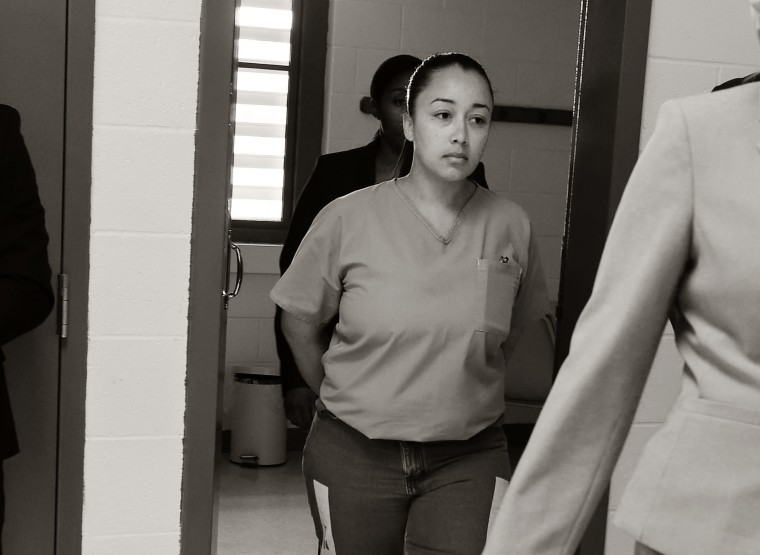Supporters of Cyntoia Brown celebrated Monday, when Tennessee Gov. Bill Haslam granted her clemency after she had served 15 years in prison. Now those supporters are turning their attention to helping other incarcerated women with similar stories.
“I’m super excited and ecstatic about the decision for her clemency,” said Ash-Lee Henderson, co-executive director of the Highlander Research and Education Center, a social justice leadership training school involved in organizing efforts to free Brown. “That doesn’t mean that there isn’t more work to do to get her completely free.
"There’s still more work to get all the other black women and girls free who are caught in the system in cases very similar to Cyntoia’s and young people that have been charged as adults.”
In 2006, Brown was tried as an adult and sentenced to life in prison for shooting and killing Johnny Mitchell Allen, who paid Brown for sex when she was 16. She said that she had been raped by a boyfriend who had forced her into prostitution, and that she killed Allen when she saw him reaching for a gun while they were in bed.
Brown, 30, is set to be released on Aug. 7 and will be on parole for 10 years.

She is one of many young black women and girls who land in the criminal justice system, often at disproportionate rates compared to white counterparts. Black women were imprisoned twice as much as white women in 2016, according to a 2018 report by The Sentencing Project. Black girls are 3.5 times as likely than white girls to be placed in juvenile detention, the report also said.
There has been some progress: From 2007 to 2014, the number of young people tried in adult courts dropped 48 percent, from 175,000 to 90,900, according to a 2017 report by the Campaign for Youth Justice. The decrease is due to states such as Connecticut, New York and Massachusetts raising the age of young people excluded by juvenile courts. But several organizations say there’s still more work to be done in courts across the United States.
Juvenile Law Center, one of several advocacy groups that filed a “friend of the court” brief in January 2018 to free Brown, opposes the practice of trying juveniles as adults, as Brown was. The law firm cites Supreme Court rulings such as Roper v. Simmons, which banned the juvenile death penalty, and Miller v. Alabama, which banned the juvenile sentencing of life without parole, as too harsh because young people's brains have not developed the ability to access consequences and impulse control.
“Holding them in prison from their 30s and beyond becomes nothing more than punishment and for a retributive purpose,” said Marsha Levick, the center's chief legal officer. “It’s no longer about keeping a community safe because we're already past the point where they would likely pose danger to their community.”
The push for Brown’s clemency kicked into high gear at the end of 2018. On Dec. 6, the Tennessee Supreme Court ruled that Brown would have to serve 51 years in prison before she could be eligible for parole. But there was still a chance the governor, who had the final say on Brown’s freedom, could decide to release her before his term ends this month.
On Dec. 17, social justice organizations launched a week of action to demand clemency, like sending letters and making phone calls to Haslam. Participants were also encouraged to write letters to their representatives and senators. The last day was dedicated to writing letters to Brown and putting money in her account.
“We had well over 1,500 people making calls and over 15,000 letters sent to his office over the last few months and mostly after the Tennessee Supreme Court ruling had come down,” said Clarise McCants, campaign director at the civil rights advocacy organization Color of Change.
There was a collective push from civil rights organizations and advocacy groups such as Black Lives Matter Nashville, Color of Change, Highlander Center and the #MeToo movement’s organizers. The calls for Brown’s release went viral on social media.
“Our goal was to amplify the efforts that were already going on, but also to bring attention to how Cyntoia’s case, in particular, was among the larger system of injustice, specifically Cyntoia being both black and woman and incarcerated at such a young age,” said Brittany Paschall, an organizer with Black Lives Matter Nashville.
Ultimately, Haslam praised Brown’s efforts to rehabilitate herself and cited that as a reason she should be released.
“Imposing a life sentence on a juvenile that would require her to serve at least 51 years before even being eligible for parole consideration is too harsh, especially in light of the extraordinary steps Ms. Brown has taken to rebuild her life,” Haslam wrote in a statement. “Transformation should be accompanied by hope. So, I am commuting Ms. Brown’s sentence, subject to certain conditions.”
While in prison, Brown obtained a GED, associate's degree and is set to obtain her bachelor’s degree in May. She also volunteers as a mentor to troubled youth in prison. Her lawyers had met with the governor and outlined her progress before he made the decision.
“I would have to say the strongest persuasive point with him was the remarkable rehabilitation record she showed,” one of Brown’s attorneys, Edward Yarbrough, said on NBC Nightly News. “Very few people are able to retain that. Some are good in school. Some could have good behavior. Some are able to help in the prison and help other people.”
Moving forward, activists are looking to supporting Brown and other survivors of sexual assault and sex trafficking who are still in prison. Color of Change has already worked on a case to free Jacqueline Dixon, who was facing murder charges for shooting and killing her abusive ex-husband. The charges were ultimately dismissed, McCants said.
Color of Change also teamed up with Survived & Punished, a coalition advocating for the freedom of survivors of sexual assault, abuse and domestic violence who are facing time or already incarcerated in New York, California and Illinois. In October, the campaign called for New York Gov. Andrew Cuomo to grant clemency to a list of people in this situation, as he has not released such a survivor in eight years. Henderson, of the Highlander Center, adds that her supporters should follow the work that Brown promises to do when she is released.
“With God’s help, I am committed to live the rest of my life helping others, especially young people,” Brown said in a statement following the clemency news. “My hope is to help other young girls avoid ending up where I have been.”

Although Monday’s news was an important victory, some of her supporters are not satisfied with her release date and are advocating to get her out of prison earlier. A petition was launched on social networking site Care2 calling for Brown’s release to be expedited, and, as of Wednesday morning, more than 22,000 people had signed. “If Haslam recognizes that her life sentence was unjust then why must she spend one more day in prison?” the campaign page reads.
According to Haslam, Brown still has to meet several requirements before August. This includes going through a transition/re-entry program, complying with an approved release plan and continuing to work toward earning her bachelor’s degree. Once on parole, Brown will be expected to maintain employment or educational enrollment, attend counseling sessions and commit to regular community service.
Now that Brown has won her fight, it is too early to tell what the impact of this case will have on criminal justice reform, but Levick, of Juvenile Law Center, hopes it can be a catalyst for change.
“I hope the case becomes a starting conversation point about examining our sentencing policies regarding young people and developing a system that is much more rational, much more developmentally appropriate, and much more reflective of these individuals’ realities and not simply focused on punishment,” she said.
